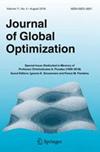神经网络优化的直流编程
IF 1.7
3区 数学
Q1 Mathematics
引用次数: 0
摘要
摘要 我们讨论了与神经网络学习和优化相关的两个关键问题:计算对抗鲁棒性的对抗攻击和复杂函数的近似优化。我们证明,这两个问题都可以作为 DC 编程的实例。我们给出了相应函数作为凸函数差分 (DC) 的明确分解,并报告了实验结果,证明了 DCA 算法应用于这些问题的有效性。本文章由计算机程序翻译,如有差异,请以英文原文为准。
DC-programming for neural network optimizations
Abstract
We discuss two key problems related to learning and optimization of neural networks: the computation of the adversarial attack for adversarial robustness and approximate optimization of complex functions. We show that both problems can be cast as instances of DC-programming. We give an explicit decomposition of the corresponding functions as differences of convex functions (DC) and report the results of experiments demonstrating the effectiveness of the DCA algorithm applied to these problems.
求助全文
通过发布文献求助,成功后即可免费获取论文全文。
去求助
来源期刊

Journal of Global Optimization
数学-应用数学
CiteScore
0.10
自引率
5.60%
发文量
137
审稿时长
6 months
期刊介绍:
The Journal of Global Optimization publishes carefully refereed papers that encompass theoretical, computational, and applied aspects of global optimization. While the focus is on original research contributions dealing with the search for global optima of non-convex, multi-extremal problems, the journal’s scope covers optimization in the widest sense, including nonlinear, mixed integer, combinatorial, stochastic, robust, multi-objective optimization, computational geometry, and equilibrium problems. Relevant works on data-driven methods and optimization-based data mining are of special interest.
In addition to papers covering theory and algorithms of global optimization, the journal publishes significant papers on numerical experiments, new testbeds, and applications in engineering, management, and the sciences. Applications of particular interest include healthcare, computational biochemistry, energy systems, telecommunications, and finance. Apart from full-length articles, the journal features short communications on both open and solved global optimization problems. It also offers reviews of relevant books and publishes special issues.
 求助内容:
求助内容: 应助结果提醒方式:
应助结果提醒方式:


